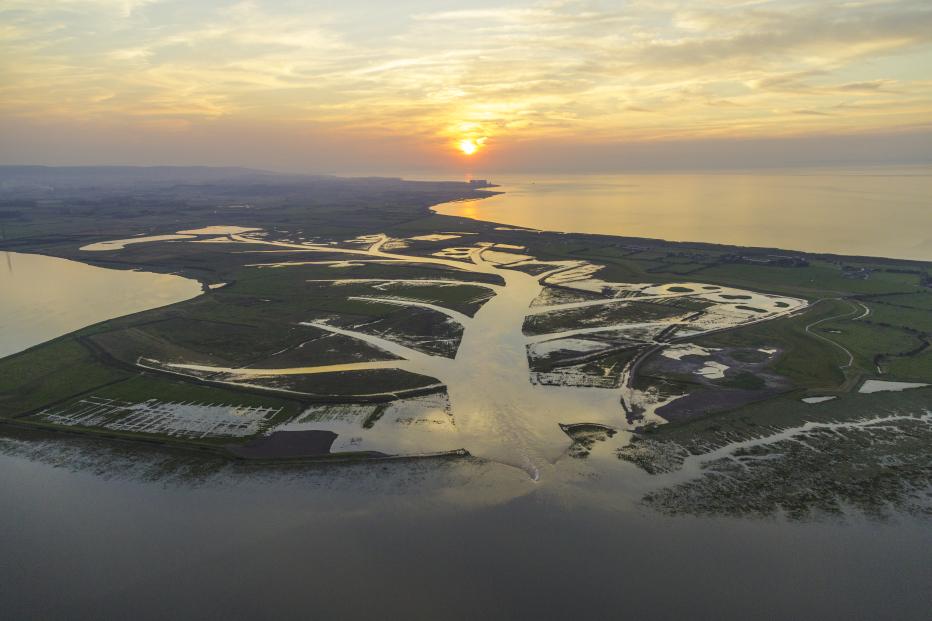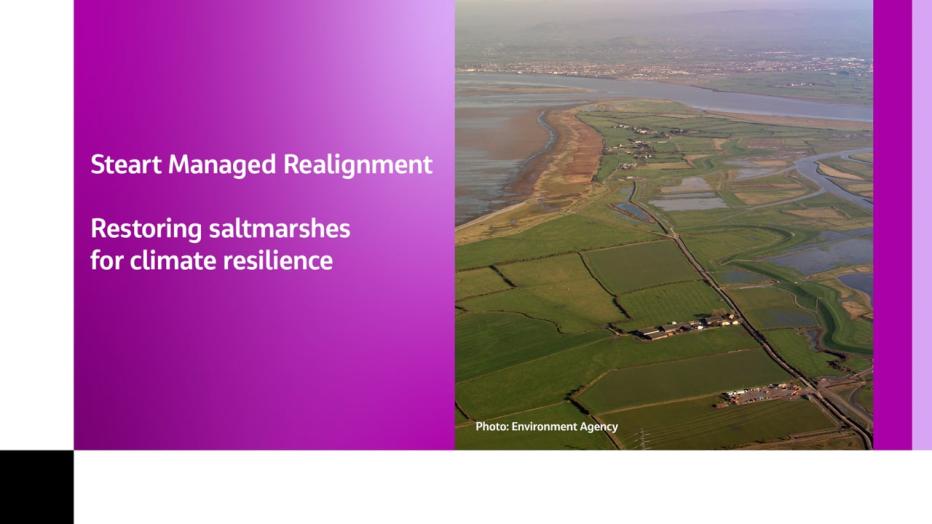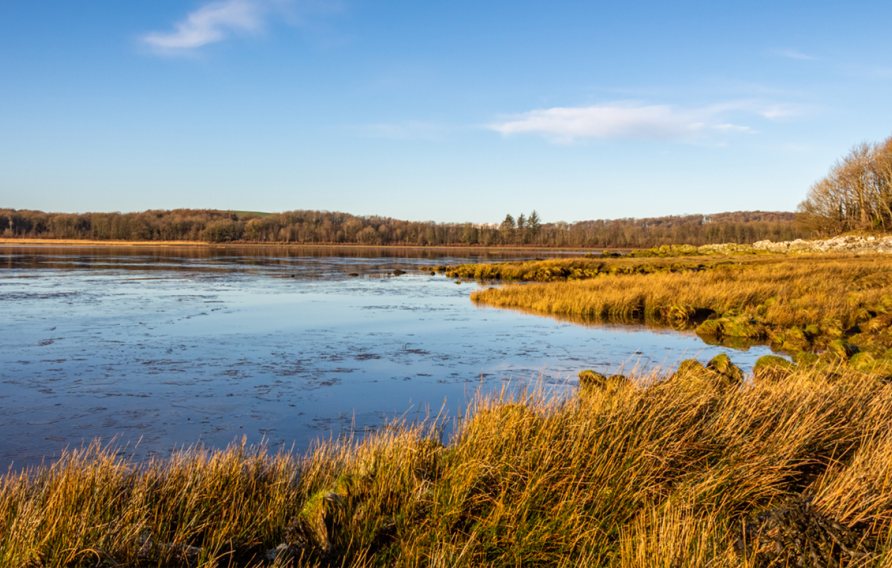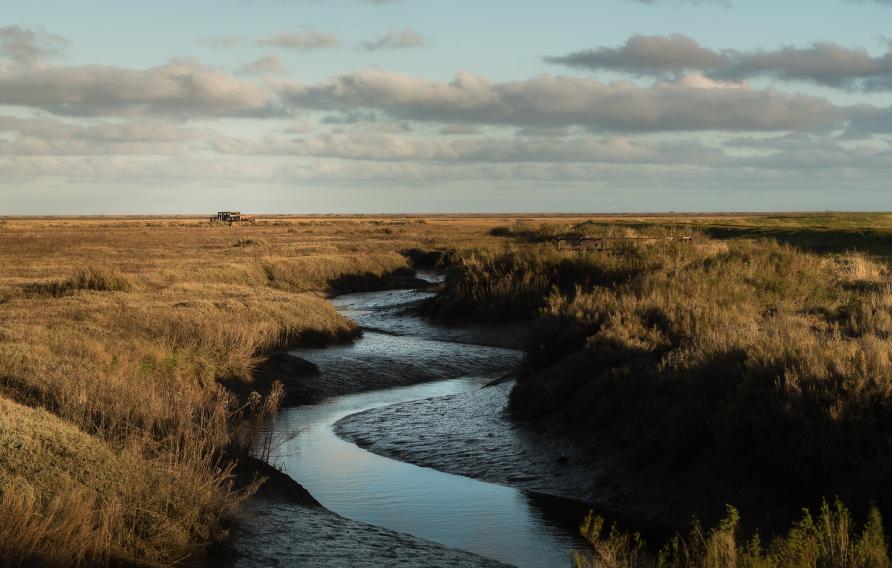Restoring Saltmarshes for Climate Resilience
One of the U.K.'s largest coastal management schemes, Steart is an example of working with nature to restore habitats, mitigate flood risk and respond to climate change

Credit: WWT Sacha Dench
The Steart Peninsula is an exposed section of coast in Somerset, south-west England, next to the Severn Estuary, vulnerable to flooding from the River Parrett at the point where it meets the sea. Jacobs was brought in as the lead consultant by the Environment Agency to design and ultimately supervise the construction of new wetlands to provide flood protection, biodiversity enhancements and recreational benefits.
-
1.5 K+
hectares (3,700 acres) of habitat delivered to date on Jacobs projects
-
60 +
Jacobs projects in the U.K. are connected with saltmarsh restoration
-
50 +
U.K. estuaries spanned by our projects
-
5
of the U.K.’s largest managed realignment schemes involved Jacobs’ support
-
10 +
meters (~32.8 feet) tidal range of the Severn Estuary, where Steart is located. This is the second largest tidal range in the world.
“Managed realignment schemes such as Steart can make a valuable contribution to sustainable coastal management, potentially offering social and economic benefits as well as environmental gains.”
IN-DEPTH
The Steart Coastal Management Project is one of the U.K.’s largest coastal habitat creation schemes, restoring over 400 ha (990 acres) of natural habitat, including large areas of saltmarsh and mudflat which are home to many sensitive species. The project reduced the risk of flooding to the surrounding community and infrastructure; in addition, it created hectares of saltmarsh, intertidal mudflat, coastal grazing marsh and freshwater lagoon, significantly improving the coastal environment and biodiversity.

Watch and learn more about the Steart Peninsula project
The success of the project was recognized by multiple awards:
- Environment Agency’s Project Excellence Awards (Sustainable Resource Management)
- Institution of Civil Engineers South West Awards (The People’s Choice)
- Green Apple Awards (Habitat and Diversity/Innovation)
- British Construction Industry Awards (shortlisted)
- Chartered Institute of Ecology and Environmental Management (CIEEM) Awards (shortlisted)
Meet some of the team
-
Nigel Pontee, Technical Lead, Geomorphological Design
Professor Nigel Pontee is Jacobs Global Principal for Coastal Planning and Engineering. Nigel has spent over two decades working on the restoration of coastal habitats around the globe, including the research, planning and design of various blue carbon studies. He is also a visiting professor in the Faculty of Earth and Ocean Sciences, University of Southampton.
-

James Scott, Engineering and Construction Contract (ECC) Site Supervisor/Designer
James is a highly capable engineer, with a broad knowledge and understanding particularly within flood risk management, with a focus on river engineering. He has deep experience in delivering complex sensitive flood risk management projects with collaborative delivery teams and managing stakeholder engagement.
-

Toby Wilson, Project Manager
Toby is a project manager, with long experience of working on large-scale restoration schemes. Toby has successfully coordinated multidisciplinary teams to deliver a detailed design through close working relationships with key stakeholders.
You might also be interested in:
-

 News
NewsJacobs to Help Develop the U.K. Saltmarsh Carbon Code
Carbon captured by coastal ecosystems such as saltmarshes, referred to as “blue carbon”, provides a natural way of reducing the impact of greenhouse gases on our atmosphere.
-

 News
NewsRedefining Coastal Squeeze: A Report for the Environment Agency
Jacobs Global Technology Director - Coastal Planning & Engineering Professor Nigel Pontee recently led the production of a report for the UK Environment Agency which will inform future assessment of coastal squeeze and the requirement for the creation of compensatory habitat.
-

 Podcasts
PodcastsCoastal Squeeze: Let's Loosen Things Up
As sea levels rise, coastal habitats will find it necessary to migrate landwards. But when human-made constructions such as sea walls impede their progress, the habitats are squeezed, resulting in the loss of life-sustaining environments. To lessen those impacts, scientists are developing solutions such as compensatory habitats to preserve affected sea-life. In this episode of If/When, we explore the challenge of coastal squeeze with Dr. Chrissy Mitchell, National Principal Research Scientist - Flood, Coast, Reservoirs, UK Environment Agency and Dr. Nigel Pontee, Global Practice Leader, Coastal Planning & Engineering, Jacobs.
-
 Page
PageBlue Carbon
Enabling decarbonization and prosperous communities
-

 News
NewsCapturing Blue Carbon in Coastal Habitats: A Q&A with Professor Nigel Pontee
Jacobs Global Technology Leader for Coastal Planning and Engineering Nigel Pontee explains how the restoration of coastal habitats like saltmarshes can contribute to climate change mitigation.
Future Foundations.
Co-creating the world to come

From developing climate resilience and transitioning to a low-carbon future, to modernizing and transforming infrastructure, governments and businesses face critical challenges. How they respond will define our future.
As our clients navigate these challenges, we help them think differently – working together to pioneer tomorrow's infrastructure solutions and build the foundations for a prosperous, secure future.













































